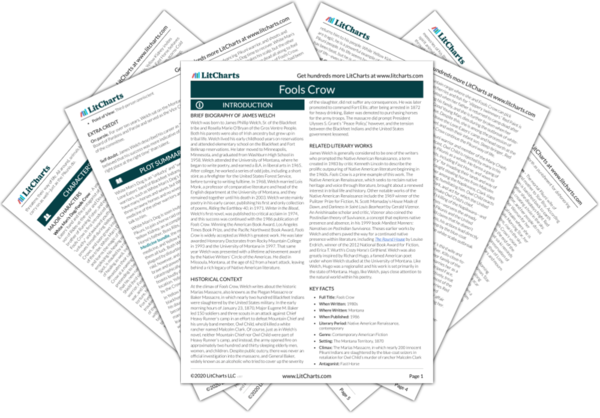Blackhorn Quotes in Fools Crow
White Man’s Dog raised his eyes to the west and followed the Backbone of the World from south to north until he could pick out Chief Mountain. It stood a little apart from the other mountains, not as tall as some but strong, its square granite face a landmark to all who passed. But it was more than a landmark to the Pikunis, Kainahs, and Siksikas, the three tribes of the Blackfeet, for it was on top of Chief Mountain that the blackhorn skull pillows of the great warriors still lay. On those skulls Eagle Head and Iron Breast had dreamed their visions in the long-ago, and the animal helpers had made them strong in spirit and fortunate in war.
[White Man’s Dog] had never touched the body of a woman. His friends teased him and called him dog-lover. […] [A friend] offered White Man’s dog some of his Liars’ Medicine to make himself attractive but it did no good. Even the bad girls who hung around the forts wanted nothing to do with him. Because he did not own a fine gun and a strong horse they ignored him.
But [White Man’s Dog] killed many animals on his solitary hunts and he left many of them outside the lodge of Heavy Shield Woman. Sometimes he left a whole blackhorn there, for only the blackhorn could provide for all the needs of a family. Although the women possessed kettles and steel knives, they still preferred to make spoons and dippers out of the horns of the blackhorn. They used the hair of the head and heard to make braided halters and bridles and soft-padded saddles. They used the hooves to make rattles or glue, and the tails to swat flies. And they dressed the dehaired skins to make lodge covers and linings and clothes and winding cloths. Without the blackhorn, the Piknuis would be as sad as the little bigmouths who howled all night.
“It surprises you that I speak the language of the two-leggeds. It’s easy, for I have lived among you many times in my travel. I speak many languages. I converse with the blackhorns and the real-bears and the wood-biters. Bigmouth and I discuss many things.” Raven made a face. “I even deign to speak once in a while with the swift silver people who live in the water—but they are dumb and lead lives without interest. I myself am very wise. That is why Mik-api treats me to a smoke now and then.”
“We will lose our grandchildren, Three Bears. They will be wiped out or they will turn into Napikwans. Already some of our children attend their school at the agency. Our men wear trousers and the women prefer the trade-cloth to skins. We wear their blankets, cook in their kettles, and kill the blackhorns with their bullets. Soon our young women will marry them, like the Liars and the Cutthroats.”
From the fires of the camps, out on the rain-dark prairies, in the swales and washes, on the rolling hills, the rivers of great animals moved. Their backs were dark with rain and the rain gathered and trickled down their shaggy heads. Some grazed, some slept. Some had begun to molt. Their dark horns glistened in the rain as they stood guard over the sleeping calves. The blackhorns had returned, and, all around, it was as it should be.












